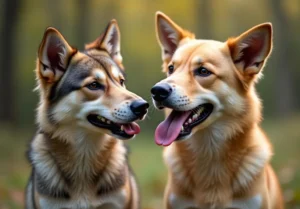Cats and dogs are both popular choices for pets, but have you ever noticed that cats are often much pickier eaters than dogs? What is it about our feline friends that make them so selective when it comes to food? Let’s explore the reasons why cats are pickier than dogs.
Innate Hunting Instincts
Cats are not just cute cuddle buddies; they are natural-born hunters. Their innate hunting instincts have shaped their taste preferences over thousands of years. Cats have a highly developed sense of taste and smell, allowing them to detect even the subtlest changes in their food. This heightened sensitivity enables them to be more selective about what they eat compared to dogs.
In the wild, cats are solitary hunters, stalking their prey for the perfect moment to strike. This instinctual behavior translates to their domesticated lives, where they prefer to eat smaller meals throughout the day rather than consuming a large amount at once. This pickiness can be frustrating for pet owners, but it is essential to respect their natural inclinations.
In addition to their hunting instincts, cats also have a higher sensitivity to bitter flavors. This means that they are more likely to reject foods that contain even a hint of bitterness. It’s not that they are being difficult on purpose; their taste buds are just wired differently. So, if your cat turns up their nose at a new food, it might be the bitter taste that they are objecting to, rather than the overall quality of the food.
Sensory Sensitivity
Cats have a higher level of sensory sensitivity compared to dogs, especially when it comes to taste. They have fewer taste buds than humans, but they are more sensitive to certain flavors, particularly bitterness. This sensitivity can make cats more discerning when it comes to their food choices.
Unlike dogs, who have a less discriminating palate and are more likely to eat anything you put in front of them, cats can be quite picky. This is not just because they are being finicky; it’s a result of their biological makeup. Understanding and respecting their sensory preferences is key to ensuring they maintain a healthy and balanced diet.
To cater to your finicky feline, try offering a variety of flavors and textures to see what they prefer. Some cats may favor wet food over dry, while others may have a penchant for fish flavors. Remember, patience is key when it comes to feeding your cat, as their sensory sensitivity plays a significant role in their food choices.
Evolutionary Differences
Cats and dogs have evolved differently over thousands of years, leading to unique eating habits. Cats, as obligate carnivores, rely on a high-protein diet to meet their nutritional needs. This specialization has made them more selective about their food choices, preferring meat-based diets. On the other hand, dogs are omnivores, able to digest a wider range of foods, which may explain why they are generally less picky eaters compared to cats. This evolutionary adaptation has influenced the taste preferences of each species, with cats being more discriminating in their food choices.
Behavioral Factors
Cats are known for their independent nature, which can play a significant role in their picky eating habits. Unlike dogs, who are pack animals, cats are solitary hunters in the wild. This independence has carried over to their domesticated behavior, making them more selective about their food. Cats may reject food that doesn’t meet their standards or preferences, exhibiting a more discerning palate compared to dogs. Additionally, cats are known to be neophilic, meaning they are suspicious of new foods and may take longer to adjust to changes in their diet. This inherent cautiousness can contribute to their picky eating behavior.
Unique Insight: Cats’ predatory instincts also play a role in their picky eating habits. In the wild, cats would select high-quality prey to ensure they receive essential nutrients for survival. This instinct may translate to their domestic behavior, where they instinctively choose food that meets their standards of freshness and quality.
Remember, understanding these evolutionary and behavioral differences can help you better cater to your feline friend’s finicky eating habits.
Health Concerns
Cats are pickier eaters than dogs due to their tendency to develop certain health issues that can affect their appetite. For example, dental problems like tooth decay or gum disease can make chewing painful, leading cats to avoid certain types of food. Additionally, kidney disease is more prevalent in cats and can cause changes in taste preferences and appetite. Digestive disorders, such as inflammatory bowel disease, can also impact a cat’s ability to digest certain foods, making them more selective in their eating habits. These health concerns can make cats more particular about their food choices and contribute to their picky nature.
Environmental Influences
A cat’s environment and past experiences play a significant role in their picky eating habits. Cats are creatures of habit, and inconsistent feeding routines can lead to a cat holding out for their preferred type of food. Offering too many choices can overwhelm a cat and make them more selective about what they eat. Stressful situations, such as moving to a new home or the introduction of a new pet, can also impact a cat’s appetite and cause them to be pickier than usual. Creating a calm and predictable eating environment can help reduce a cat’s pickiness and encourage healthier eating habits.
Breed Variations
When it comes to cat breeds, some varieties might be more predisposed to being picky eaters due to their genetics or specific dietary requirements. For example, Siamese cats are known to have strong preferences and may turn their noses up at certain foods. On the other hand, Maine Coons tend to have hearty appetites and are less likely to be picky.
If you have a picky eater belonging to a specific breed, it’s essential to understand their unique needs and preferences. Consult with your veterinarian to ensure you are providing the right balance of nutrients for your cat’s breed. Additionally, experimenting with different textures and flavors of cat food tailored to their breed characteristics could help entice them to try new foods. Remember, patience and persistence are key when dealing with picky cat eaters.
Tips for Dealing with Picky Cats
Dealing with a picky eater kitty can be a real challenge. However, there are several strategies you can employ to encourage your cat to try new foods and maintain a balanced diet. Here are some practical tips to help you navigate through this feline conundrum:
- Mix it up: Offer a variety of wet and dry cat food options to see what your cat prefers.
- Gradual introduction: Introduce new foods slowly to prevent overwhelming your cat’s palate.
- Treat incentives: Use treats to reward your cat when they try new foods, creating positive associations.
- Scheduled feeding: Establish a regular feeding schedule to encourage consistent eating habits.
By experimenting with different techniques and understanding your cat’s individual preferences, you can help your picky eater find a diet that works for them. Remember, every cat is unique, so don’t give up if one approach doesn’t work – keep trying until you find what works best for your furry friend.
Fun Fact: Cat Taste Buds
Did you know that cats have fewer taste buds than dogs? While dogs have around 1,700 taste buds, cats only have about 470. This means that cats are less sensitive to different flavors, making them more particular about what they eat. Their taste buds are also tuned to detect prey-like tastes, such as sourness, bitterness, and umami, which can explain why they might reject certain foods that don’t meet these criteria.
Additionally, cats lack the genetic ability to taste sweetness, unlike dogs. This unique biological difference can result in cats being less interested in certain types of food that may appeal to dogs, contributing to their fussiness when it comes to mealtime.
Unique Cat Behaviors
Apart from their taste buds, cats have other distinct behaviors that contribute to their picky eating habits. For instance, cats have a heightened sensitivity to texture, so they may avoid certain foods based on how they feel in their mouths. This can make them more selective about the types of food they consume, leading to pickier eating habits compared to dogs.
Furthermore, cats are known to be creatures of routine and can be wary of new or unfamiliar foods. This cautious nature can make them hesitant to try new flavors or textures, further reinforcing their selective eating habits. Additionally, cats are natural hunters and prefer to consume fresh, meat-based foods, which may explain their preference for certain types of protein-rich diets.
In summary, cats’ unique taste buds and behaviors, such as texture preferences and cautious nature, contribute to their pickier eating habits compared to dogs. Understanding these factors can help cat owners choose the right foods to meet their feline friends’ nutritional needs and preferences.
The Future of Cat Nutrition
Hey there, cat lovers! Looking into the crystal ball of feline nutrition, we can see some exciting trends on the horizon. As experts dive deeper into understanding our finicky feline friends, personalized nutrition is set to be a game-changer. Just like us humans, cats have unique taste preferences and dietary needs. By tailoring their meals to their specific likes and requirements, we can help address picky eating habits and boost their overall health. Another futuristic concept gaining traction is functional foods. These are specially formulated to improve specific aspects of a cat’s health, such as digestion, skin, or even stress levels. With these advancements, the days of struggling to find the perfect food for your picky eater might soon be a thing of the past!
Here’s a quick list of some emerging trends in cat nutrition to keep an eye on: 1. Alternative protein sources like insect or plant-based proteins are becoming more popular. 2. Digestibility studies are helping create more easily digestible foods for cats with sensitive stomachs. 3. Prebiotics and probiotics are being added to cat food to promote healthy gut bacteria. 4. Hydration-focused diets are being developed to support cats’ natural thirst drive.
Keep an eye on these trends and consult with your vet to see how they can benefit your furry friend!
Additional Insight:
Brain-health focused diets are gaining attention as research shows the importance of omega-3 fatty acids and antioxidants in preserving cognitive function in aging cats. Look out for formulas enriched with DHA and EPA to support your cat’s mental acuity as they grow older.
Alex, a passionate animal lover, has experience in training and understanding animal behavior. As a proud pet parent to two dogs and three cats, he founded AnimalReport.net to share insights from animal experts and expand his knowledge of the animal kingdom.




